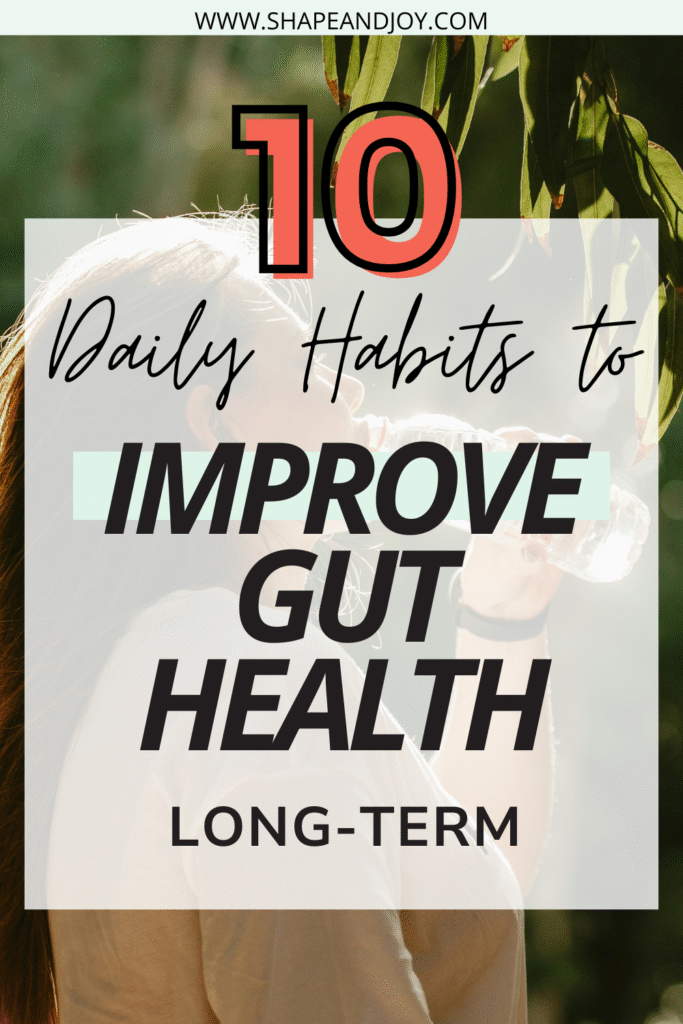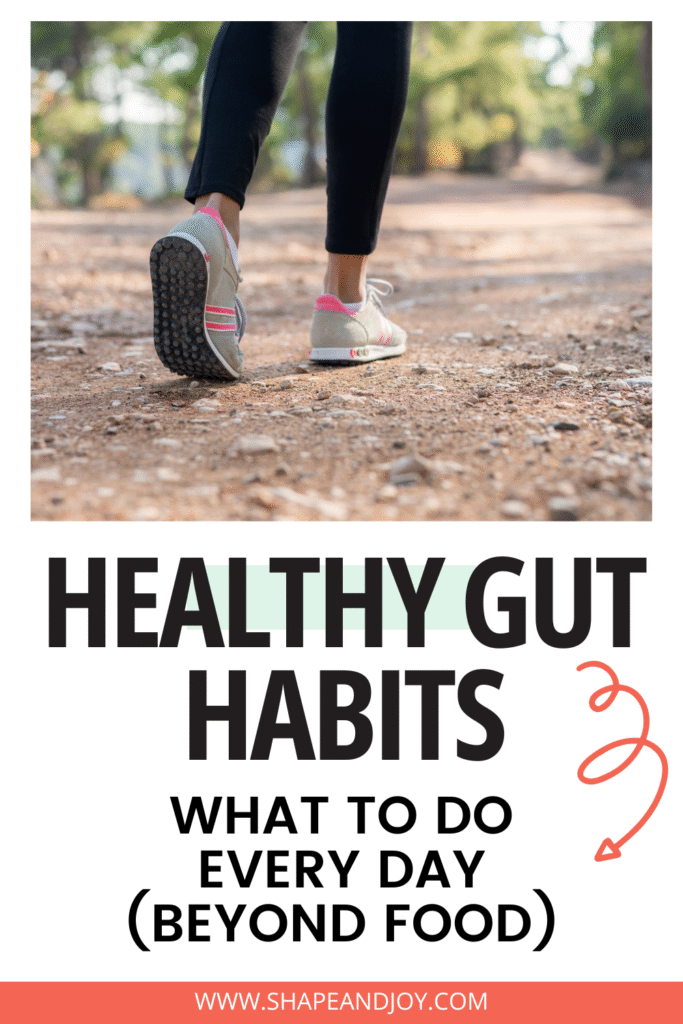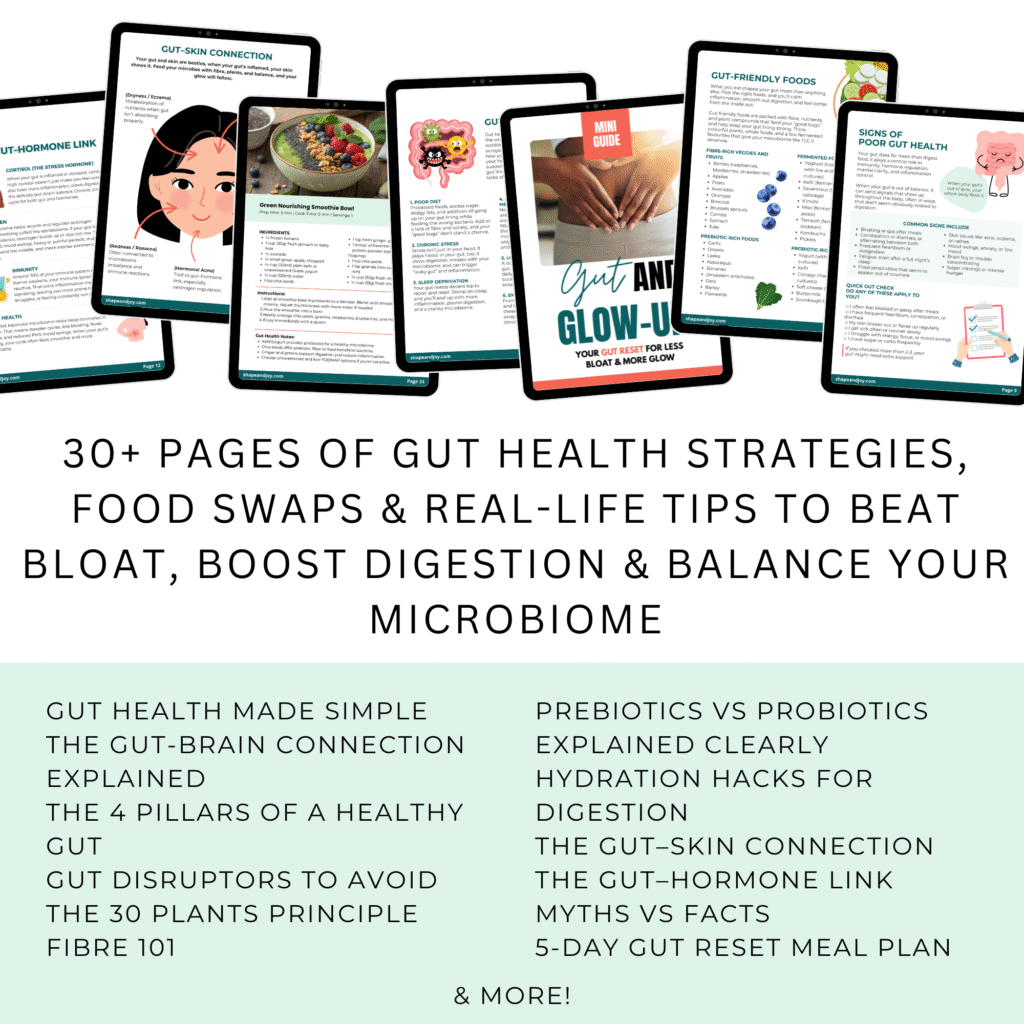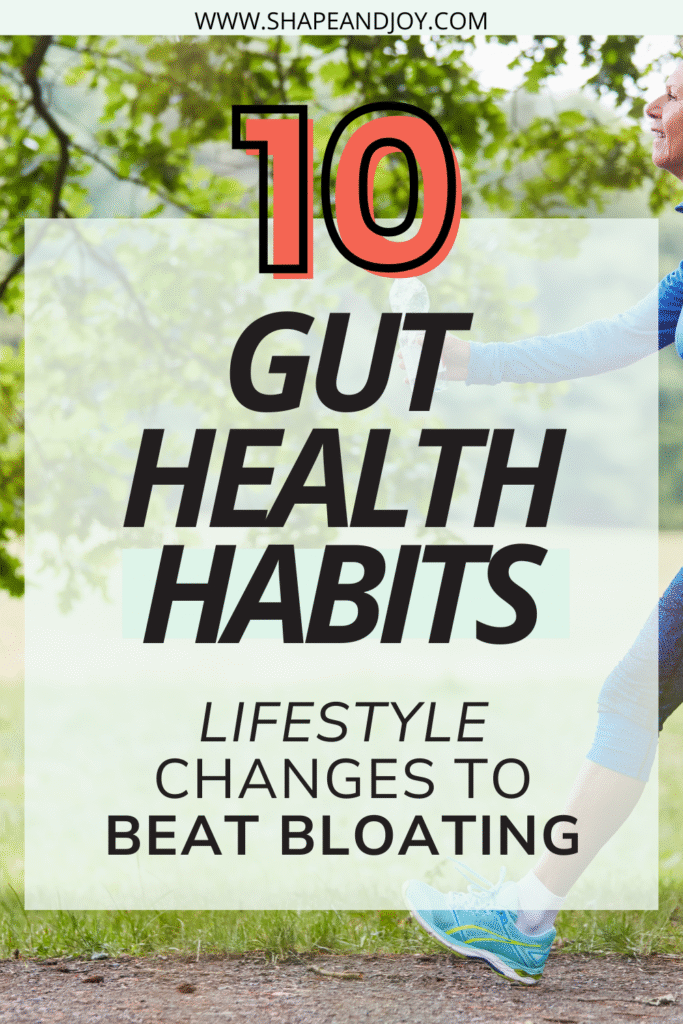This post may contain affiliate links, which means that I may earn a commission if you click on the link, with no cost for you. It’s one of the ways I support my blog. You can read more about this here.

Hands up if you’ve ever thought, “If I just find the right diet, all my problems will be solved.” Spoiler alert: it’s not quite that simple. Yes, what you eat absolutely matters, gut healing recipes, probiotic foods, and a solid gut friendly diet plan can work wonders to improve gut health.
But here’s the kicker: food isn’t the whole story.
Your gut doesn’t live in isolation. Stress, sleep, movement, and even the way you chew your food all affect your digestion and microbiome. That’s why some people follow the “perfect” gut diet meal plan yet still feel bloated, tired, or stuck.
This post will show you 10 daily habits that go beyond food to improve gut health long-term. Think of them as the secret sauce, the tweaks that make your gut healing diet actually stick. Let’s dive in.
1. Prioritise Sleep for a Healthy Microbiome
A healthy gut starts with good sleep. Your digestive system runs on a rhythm, and staying up late scrolling Instagram isn’t doing it any favours.
Aim for 7-9 hours, and keep bedtime consistent. Better sleep = better digestion and a calmer microbiome.
2. Manage Stress Before It Manages You
High cortisol is a gut’s worst nightmare. Stress can slow digestion, fuel bloating, and even flare up IBS.
Daily stress-busting habits – journaling, walks, breathwork, or meditation, can do more for your belly than another restrictive leaky gut diet.
3. Walk It Out
Movement doesn’t need to mean a sweaty HIIT class. Gentle walks, yoga, or stretching are magic for your digestive system.
Even a 20-minute walk after dinner can improve digestion and support a healthy gut.
4. Hydrate!
Forget fizzy drinks, your gut loves water, herbal teas, and broth. Drinks for gut health keep everything moving, reduce constipation, and support your gut lining.
If plain water bores you, jazz it up with lemon, mint, or cucumber.
5. Eat at Consistent Times
Your gut thrives on routine. Skipping breakfast one day and bingeing late the next confuses your digestive system.
Try eating around the same times daily to give your gut a rhythm it can rely on.
📌 Pin this for later! ⬇

6. Slow Down and Chew Properly
Yes, really. Chewing is the first stage of digestion, and rushing through meals makes your gut work overtime.
Put the fork down between bites and chew your food like you mean it. Your microbiome will thank you.
7. Add Variety to Your Routine
You’ve heard “eat the rainbow,” but it’s more than a slogan.
A healthy microbiome thrives on diversity. Aim for 30 different plants a week, fruit, veg, whole grains, herbs, nuts, seeds. Stuck for inspiration? Check out Gut Health 101: What It Is and Why It Matters for the basics on why diversity is key.
8. Spend Time Outdoors
Fresh air and sunshine boost vitamin D, which supports immune and gut health.
Plus, exposure to nature introduces you to different microbes, a natural way to strengthen your microbiome without another supplement.
9. Limit Alcohol and Ultra-Processed Foods
Even the best gut health recipes won’t undo daily takeaways and too much wine.
You don’t need to ban everything, but cutting back on alcohol and processed junk makes a massive difference to how your gut feels. If you need help making swaps, read What to Eat for Good Gut Health (and What to Avoid).
10. Journal or Meditate for Gut Calm
Mind-body connection is real. Journaling or mindfulness isn’t just “woo-woo”, it lowers stress, improves digestion, and supports good gut health.
Just 5-10 minutes a day can reset your nervous system and your belly.
How to Make These Habits Stick
The trick isn’t doing all 10 at once. Start small. Add a walk after dinner. Swap fizzy drinks for herbal tea.
Stack new habits onto ones you already do, like meditating for 5 minutes after brushing your teeth. Consistency beats intensity every time.
And when you’re ready to layer in more food-focused strategies, check out The 21-Day Gut Healing Meal Plan for a Healthier Microbiome. It shows you exactly what to eat for better gut health while these habits do the heavy lifting.
Feeling Bloated and Out of Balance? This Might Help
If every meal leaves you uncomfortable, your skin’s flaring up, or your energy feels stuck on low, it’s not just bad luck, it’s your gut asking for a reset.
That’s why I created the Gut & Glow Reset Mini Guide – your no-fluff roadmap to calming digestion, beating the bloat, and finally feeling good from the inside out.

Inside, you’ll get:
- Gut health made simple (without the confusing jargon)
- The 4 pillars of a healthy gut (and how to put them into practice)
- Fibre, prebiotics & probiotics explained clearly (plus easy food swaps)
- Gut disruptors & myths debunked (so you know what really matters)
- The gut–skin & gut–hormone links (and how to get them back on track)
- A 5-Day Gut Reset Meal Plan with simple, gut-friendly recipes
Whether you’re brand new to gut health or just need a reset, this guide takes away the guesswork and gives you simple steps you can actually stick to.
Read These Next
- Gut Health 101: What It Is and Why It Matters
- What to Eat for Good Gut Health (and What to Avoid)
- The 21-Day Gut Healing Meal Plan for a Healthier Microbiome
Conclusion
Food is powerful, but it’s only part of the picture. By adding daily habits, sleep, stress relief, hydration, movement, you’ll create a foundation to improve gut health.
Small, consistent actions really do lead to a healthier microbiome and better digestion long-term.
Next Steps
“Your gut doesn’t need perfection, it needs consistency.”
- Grab your freebie: The Gut Reset Starter Kit
- Read This Next: What to Eat for Good Gut Health (and What to Avoid) – so you can pair your new habits with the best gut-friendly foods.
📌 Pin this for later! ⬇




